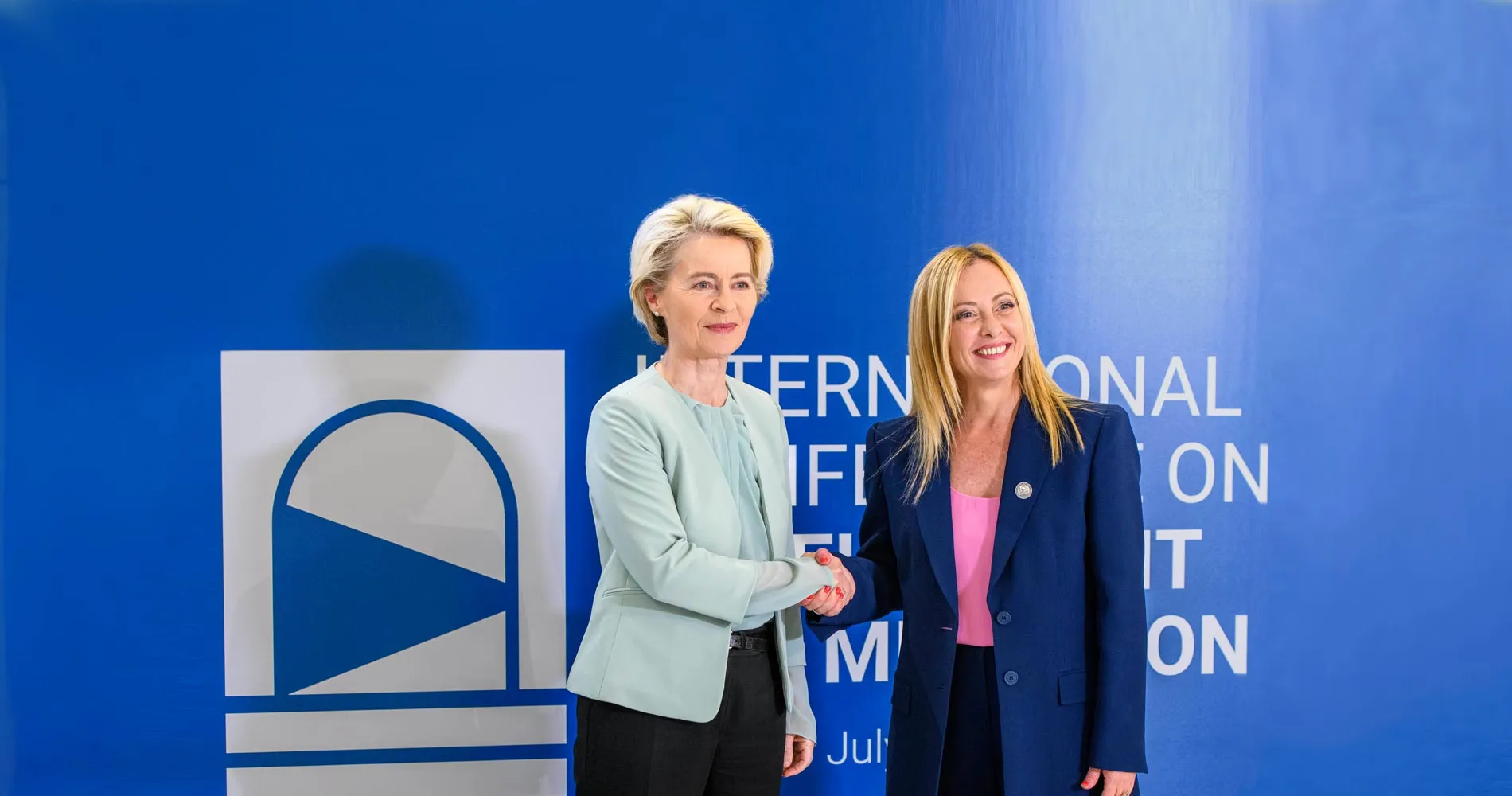Since taking office, Giorgia Meloni has garnered attention both domestically and internationally for her migration policies. Her pragmatic approach has served as an example for the new EU Migration and Asylum Pact. A consensus has been reached among Member States that countries at the EU’s outer border cannot be left alone to deal with the deluge of migrants entering the EU illegally via the Mediterranean route. The issue of illegal migration is affecting all Europeans and it will be a central issue in the upcoming EU Parliamentary elections in June 2024.
Silvia Caschera
18 April 2024
Arabic version | German version | French version | Spanish version
Italy, like Greece, bears the brunt of illegal migration owing to its position as an external border of the European Union. The central Mediterranean route is the most frequently used path for migrants attempting to reach Europe, with Italy serving as the main gateway.
In recent years, the number of irregular migrant arrivals has fluctuated significantly, with a notable peak in 2016 and 2017, when 180,000 and 119,000 migrants respectively landed on the shores of the Italian peninsula, making Italy the number one destination for migrants in 2017 with 67% of total entrants to the EU. While arrivals went down significantly in 2019 (recording 11,471 new migrants), the influx of migrants has steadily resumed since 2020.
Before taking office in 2022, Meloni was highly critical of the EU’s migration policy. Since becoming Italy’s Prime Minister, Meloni herself has publicly acknowledged that her electoral promises regarding immigration have been unfulfilled so far. The complexity of the issue and a commitment to avoiding short-term solutions have prompted her government to find the desired support beyond its shores in Albania and Africa.
And Meloni has been very successful. Not only was she instrumental in the EUR 7.4 billion ($8 billion) aid package for Egypt to keep migrants in Egypt and away from the shores of Europe, but Albania and Italy have also come to an agreement on keeping migrants out of EU territory.
The EU-Egypt aid package was signed during the Egyptian-EU Summit in Cairo on 15 March 2024. In addition to Prime Minister Meloni, the Summit was attended by Egyptian President Abdel Fattah el-Sissi, European Commission President Ursula von der Leyen, and the leaders of Austria, Belgium, Cyprus, and Greece. Notably, the EU will provide assistance in the form of grants and loans for Egypt to fortify its borders, especially with Libya, and to support Egypt in hosting Sudanese who have fled their homeland. More than 460,000 Sudanese have fled to Egypt since April 2023.
Meloni hailed the deal as historic, stating that „it is also the best way to face the problem of illegal migration to fight human traffickers. The best way is to reaffirm the right of the citizens of the African continent not to immigrate towards Europe, and that is something that we can do only with development.”
On 17 January 2024, the UK Prime Minister, Rishi Sunak, who shares with Meloni the belief that only a Europe-wide revision of international asylum rules can provide support to those who truly need help, saw the approval of a bill he submitted for deportation of illegal immigrants to Rwanda.
Just as the United Kingdom found a partner in Rwanda, Meloni has found an ally beyond the EU. Albania is ready to host migrants collected in Italian waters and awaiting asylum. As expected, the deal has sparked controversy among international human rights organizations. It even faced opposition from lawmakers in Albania’s Constitutional Court, who argued that it violated the constitution by transferring territory and state power to another country, despite ultimately approving it last month. Unexpectedly, Brussels has given its support to the deal, with Ursula Von der Leyen praising the initiative as “an example of out-of-the-box thinking, based on the fair-sharing of responsibilities with third countries”.
This rapprochement between Italy and Brussels seems to have reached new levels of cooperation and dialogue. PM Meloni played a central role in the approval of the EU Migration and Asylum Pact, which the EU Parliament passed on 10 April 2024. The reform, which had faced multiple failures over the past decade, is now celebrated in Europe as a historic success. In a time when immigration is one of the most important issues facing the EU, the EU has rallied around Italy’s requests for solidarity from other Member States—both in terms of financial support or reception of migrants. Countries on the EU’s outer borders will no longer be left alone to deal with the large influx of migrants trying to enter the EU.
The new EU Asylum Pact will ensure secure external borders, fast and efficient procedures also at EU external borders with clear asylum rules, and improved identification upon arrival with mandatory security and health checks. In addition, Member States can choose between making financial contributions or taking on responsibility for asylum applicants.
However, Meloni is not fully satisfied with the EU efforts and, in her quest for mainstream recognition as an international conservative stateswoman, is going solo by reviving the Mattei Plan – an initiative in the 1950’s where Italy supported development of select African countries whose economic growth in turn facilitated Italy’s energy independence. Presented in January 2024 at a summit in Rome in front of 20 African leaders and European Union representatives, this USD 5.95 billion investment plan for Africa is designed to keep migrants in their home countries. Rome hopes that expanding and strengthening cooperation with the African continent in energy, development and infrastructure sectors will curb migration flows, diversify energy sources, and forge a new, equal relationship between Europe and Africa. This model might also be followed by the EU or other EU border states.
Keeping migrants in their homeland and stopping them from embarking on the dangerous journey over the Mediterranean route will save lives, reduce costs, fight criminal gangs and encourage legal migration into the EU. The International Organization for Migration (IOM) has stated that at least 3041 people died in 2023 trying to cross the Mediterranean. Since 2014, the IOM has counted at least 28,320 men, women and children who died in an attempt to reach Europe.
Meloni’s stance on immigration has been a subject of debate and change over time, but it is evident that she has played a key role in shaping the European discourse on this topic. Initially considered a Eurosceptic who would isolate Italy from other countries, Meloni has instead established multiple channels of dialogue with the President of the European Commission and has influenced immigration decisions.
Italy is a key destination on the migration route to Europe. Meloni’s approach of supporting African countries aimed at reducing the influx of economic refugees has become a model for many European leaders. As the June EU Parliamentary elections approach, the topic of illegal migration into the EU will continue to be one of the most pressing issues affecting voters. As economic conditions continue to get more difficult, Europe’s social welfare system and those paying into it, will not be able or willing to continue to support economic refugees who are looking for a better life in the EU.







